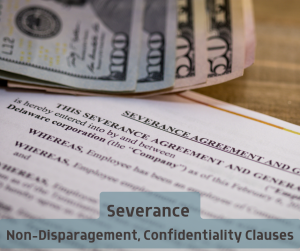Employers who have not already done so should comprehensively review their past and present severance agreements to ensure that any non-disparagement and confidentiality clauses contained therein do not run afoul of the National Labor Relations Board’s ruling in a February 2023 case called McLaren Macomb, in which the NLRB significantly—and retroactively—restricted employers’ rights to include such clauses.
Referring to a provision of the National Labor Relations Act (NLRA) that protects employees’ rights to “engage in protected, concerted activities to address or improve working conditions,” the board wrote that: “a severance agreement is unlawful if its terms have a reasonable tendency to interfere with, or coerce employees in the exercise of their Section 7 rights.”
This dynamic would be triggered, according to the NLRB, when a severance agreement conditions benefits, such as money, on an employee not making disparaging statements that could potentially harm the employer’s image—and, by implication, coerces the employees not to exercise their Section 7 rights.
In the case in question, the non-disparagement provision also did not define what types of statements could be considered disparaging, nor was it limited by time or scope—all factors that led to the NLRB’s ruling, which overturned two previous cases decided by the board during the Trump administration, with a different set of members.
In addition, the McLaren Macomb ruling noted that the confidentiality agreement in question prevented departing employees from discussing the agreement’s terms with anyone besides a spouse, or legal or tax adviser, which the NLRB ruled to be too broad and thus coercive.
As written, the provision also prohibited the plaintiff from discussing their agreement with former co-workers, violating the NLRA’s stipulation that employees are permitted to assist co-workers with workplace issues—and indeed, would have prevented the plaintiff from reporting their complaint to the NLRB, in the first place, had they followed it to the letter.
But the NLRB did not ban non-disparagement and confidentiality provisions in severance agreements altogether, which means employers are still permitted to include them as long as they are “narrowly tailored”—a term that the board did not define precisely.
However, the board did note that it had approved agreements in the past that waived only the signing employee’s rights to pursue employment-related claims. And the board’s general counsel published a non-binding memorandum blessing agreements with “a narrowly tailored, justified, non-disparagement provision” limited to employee statements that meet the definition of defamation. This means they are “maliciously untrue” either in the sense of knowingly false, or “with reckless disregard for their truth.”
The memorandum also said requiring non-disclosure of the financial terms of a settlement between employer and employee (i.e. not involving the NLRB) would be allowable, as would temporarily restricting, for valid business reasons, the dissemination of trade secrets or other proprietary information. Lastly, the general counsel suggested that employers reach out to former employees to clarify that provisions now considered out of bounds no longer applied to them.
Ultimately, wording and scope of provisions related to non-disparagement and confidentiality in severance agreements can help employers toe the fine line of what’s now considered unlawful under the McLaren Macomb decision. Be sure to consult with your business attorney to ensure that you’re staying on the right side of that line.
 Chicago Business Attorney Blog
Chicago Business Attorney Blog


